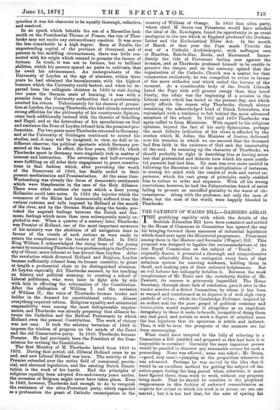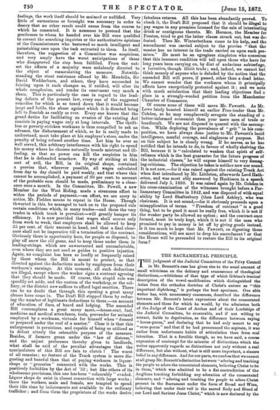THE PAYMENT OF WAGES' BILL.—DANGERS AHEAD.
THE gratifying rapidity with which the details of the Scottish Education Bill have been examined and settled by the House of Commons in Committee has opened the way for bringing forward those measures of industrial legislation which stand next upon the Ministerial programme. Prominent among them is the Masters and Servants' (Wages') Bill. This proposal was designed to legalise the recommendations of the late Royal Commission on the subject of "Truck." As originally drawn, it presented a thorough and comprehensive scheme, admirably fitted to extinguish every form of that nefarious system for coercing workmen, holding them in thrall, and making gain of their enforced helplessness. But an evil fortune has unhappily befallen it. Between the weak complaisance of Mr. Bruce and the crotehetty dislike of Mr. Fawcett, its success is grievously imperilled. The Home Secretary, through sheer lack of resolution, gave it over to the tender mercies of a Select Committee, by whom it has been so warped and transformed as to deprive it of well nigh every particle of virtue ; while the Cambridge Professor, inspired by an ardent zeal for the pure gospel of political economy and laissez-faire, would supersede it altogether as an expedient derogatory to those it seeks to benefit, incapable of doing them any real good, and certain to work a degree of mischief none the less injurious that its operation is subtle and indirect. Thus, it will be seen, the prospects of the measure are far from encouraging.
What could have tempted to the folly of referring to a Committee a Bill justified and prepared as this had been it is impossible to surmise ? Certainly the most ingenious person would be puzzled to discover any reasonable excuse for such a proceeding. None was offered ; none was asked ; Mr. Brace, —good, easy man I—jumping at the proposition whenever it was advanced. Perhaps he was moved by the idea that it would be an excellent method for getting the subject off the notice-paper during the long period when, otherwise, it must have figured there, from week to week, without any progress being made. That he should be sensitive to the perpetual reappearance in this fashion of awkward remembrances as respects the extent to which his work is in arrear, no one can marvel ; but it is too bad that, for the sake of sparing his fabulous returns. All this has been abundantly proved. To check it, the Draft Bill proposed that it should be illegal to pay wages in any premises licensed for the sale of intoxicating drink or contiguous thereto. Mr. Hermon, the Member for Preston, tried to get the latter clause struck out, but was de- feated. Then Mr. Winterbotham came to his help, and the amendment was carried subject to the proviso " that the master has no interest in the trade carried on upon such pre- mises." He must be an egregious simpleton who conceives that this innocent condition will tell upon those who have for long years been carrying on, by dint of audacious subterfuge, a lucrative, though illicit trade ; and, indeed, we cannot but think meanly of anyone who is deluded by the notion that the amended Bill will prove, if passed, other than a dead letter. We cannot wonder that the workmen whom it principally affects have energetically protested against it ; and we note with much satisfaction that their leading objections find a place in a strongly-worded petition from the Manchester Chamber of Commerce.
Of course none of these will move Mr. Fawcett. As Mr. Lowe lately boasted himself an earlier Free-trader than Mr. Cobden, so he may complacently arrogate the standing of a better-informed economist than your mere men of trade or handicraft. We are not disposed to quarrel with the assump- tion. While deploring the prevalence of " grit " in his com- position, we have always done justice to Mr. Fawcett's lucid intelligence, manful courage, and singleness of purpose. But on this subject he is clearly wrong. If he moves, as he has notified that he intends to do, in favour of wholly shelving the Bill, because it is "calculated to weaken that spirit of self- reliance which is the best guarantee for the future progress of the industrial classes," he will expose himself to very damag- ing criticism. The objection he takes is neither new nor sound. It is not new,—for it was raised against the existing Truck Act when first introduced by Mr. Littleton, afterwards Lord Hath- erton, and was most ably answered by Huskisson in a speech delivered July 5, 1830. It was raised again by Mr. Cobden in his cross-examination of the witnesses brought before a Par- liamentary Committee in 1842, and was disposed of with equal ability by Lord Shaftesbury (then Lord Ashley), who was chairman. It is not sound,—for it obviously proceeds upon a misapplication of terms. "Freedom of contract" is a good thing, but to be good it must be really free, which it is not if the weaker party be allowed no option ; and the contract once formed, must be truly kept, which it is not if the man who promised to pay in money is let off by giving goods instead. Is it too much to hope that Mr. Fawcett, on digesting these considerations, will see meet to drop his amendment ? or that the House will be persuaded to restore the Bill to its original form?



































 Previous page
Previous page